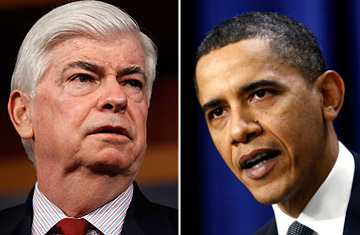
(2 of 2)
Dodd is right that he can't try to shimmy past a filibuster in an election year by cobbling together 59 Democrats and a Republican; it's probably hopeless, and certainly hopeless without cutting unsavory deals like the toxic Cornhusker Kickback on health care. But weakening the bill won't get him to 60 either; it will just alienate Democrats committed to reform in the House as well as the Senate, while most Republicans will still find some reason to oppose it.
The only hope for consensus is a bill that takes an unmistakably tough line on Wall Street, which could end up striking a political chord and persuading recalcitrant Republicans and unenthusiastic Democrats that they have to support it if they don't want to look like Wall Street apologists. Again, this is not a likely scenario; the health care experience suggests that even preposterous attacks on complex legislation can provide cover for opponents, and Republicans are already starting to portray tougher financial rules as a new Wall Street bailout. But this is at least a plausible scenario; a Harris poll released yesterday found that 82% of Americans support reforms.
The most credible scenario for an irresistible groundswell of public support would have to include a tough consumer agency that would regulate financial products the way the FDA regulates food and drugs, along the lines proposed by bailout watchdog Elizabeth Warren. It wouldn't have to be a stand-alone agency; the FDA isn't, and nobody thinks of the Office of the Comptroller of the Currency as a Treasury agency just because its employee emails end with treas.gov. But it would have to be truly independent, with its own budget, its own presidentially-appointed director, and preferably its own address; it can't be subservient to the larger mission of the Treasury or the Federal Reserve, and it shouldn't be tucked in their basements. It would have to enforce rules as well as write them; otherwise, we'd remain dependent on the same regulators who failed us last time. And those rules would have to apply to all bank and non-bank institutions, including the payday lenders who contributed so generously to Corker's campaigns; otherwise, the loan business would simply move to the unregulated corners of the market.
An independent consumer agency isn't the most vital provision for preventing another meltdown, but it's the most vital provision for persuading ordinary families that reform is about them. And along with significantly less vital provisions that would help shareholders rein in executive pay, it's the starkest way to make the case that opposing reform means doing the bidding of Wall Street. Sure, disputes over systemic risk, clearinghouses for derivatives, resolution authority for failing firms and proprietary trading are all important, but they're not going to move the masses.
In the end, of course, a tough bill would face long odds. The money and power of the financial industry would be arrayed against it. There would be so many arcane moving parts — How much authority for the Fed? Should end users be exempt from derivatives regulation? Should something be done about naked credit default swaps? — that reaching consensus by August would be challenging even if everyone wanted it. And it's not clear that anyone is desperate to have it; there probably won't be another meltdown this year, and Democratic leaders may be content to let Republicans block reform so they can blast them as Wall Street shills in November. But it's at least possible that Republicans will decide that they want to keep the focus on health care, that giving Democrats a populist issue could transform the landscape before the midterms, that letting financial reform pass would defuse accusations of obstructionism.
In any case, a weak bill would face insurmountable odds. So hanging tough is not just better politics for Democrats; it's the only chance for Dodd to burnish his legacy. And after the worst regulatory breakdown in 80 years, it also happens to be the right thing to do.
